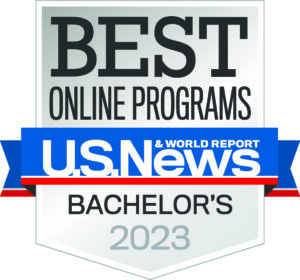Download a Free
UW Flexible Option Info Kit
Health science is the application of science to health, including the study of medicine, nutrition, and other health-related topics and how they affect humans. Healthcare is one of the fastest growing industries in the US. New technologies, the need to replace workers leaving the sector, and an aging population are driving this growth. According to the US Bureau of Labor Statistics, the need for qualified healthcare professionals across all positions will continue to grow faster than average, along with the industry in general. If you want to work in healthcare, or want to move into another role but need a bachelor’s degree, now is the time to earn the University of Wisconsin-Milwaukee Bachelor of Science in Biomedical Sciences: Health Sciences degree. Your associate degree gives you 60 credits toward the 120-credit degree completion minimum. Offered in the self-paced, competency-based UW Flexible Option format, this degree completion program offers you the opportunity to build on your education and experience. You’ll develop and strengthen your skills in critical thinking, problem solving, information literacy, informatics, and management. This degree program prepares you to assume a wide range of roles within both clinical and non-clinical settings such as hospitals and other patient care facilities, government organizations, or insurance companies. The Health Sciences degree curriculum may also provide the foundation required for entry into advanced degree programs such as physical or occupational therapy, physician’s assistant, and more. Learn more ways you can use a bachelor’s in Health Sciences for a career in healthcare. The UW-Milwaukee Health Sciences degree program is designed to allow you to earn additional credentials while earning your degree—like the Interprofessional Leadership in Healthcare Microcredential and Health Care Informatics Certificate. Earning the Interprofessional Leadership in Healthcare Microcredential is as easy as completing three courses in the Health Sciences degree program. Upon completion of these courses, you’ll be awarded a digital badge that you can use anywhere to show your accomplishment and your interprofessional leadership skills, while still earning your degree. Current students can check with your Success Coach to learn more about your progress. Interested in earning this microcredential, but not the degree? Learn more. You can earn the Health Care Informatics Certificate by choosing the six elective courses that make up the certificate. You’ll gain the skills and knowledge to understand, analyze, and evaluate the information used by successful healthcare organizations to provide patient care. In addition, it can prepare you for a wide range of career options with hospitals, clinics, insurance companies, and pharmaceutical firms, as well as companies who design, develop, and implement health information systems. Current students can check with your Success Coach to learn more about your progress. Interested in earning this certificate, but not the degree? Learn more. This UW Flexible Option program is designed for self-motivated learners who want to leverage their previous work skills and knowledge to advance more quickly to a degree. This online, self-paced format is ideally suited for: The UW Flexible Option is a national pioneer in competency-based education for adult learners. This means you can earn your degree without sacrificing your commitments to work and family. The competency-based and self-paced format of UW Flexible Option programs fits around your schedule, as you balance your responsibilities with your educational goals. In this program you’ll: The University of Wisconsin-Milwaukee College of Health Professions and Sciences offers a wide array of health-related academic programs in biomedical sciences, global health, health care administration, nursing, the rehabilitation sciences and sustainable peacebuilding. The faculty and staff in these areas are training our graduates for high-demand careers. Many of our degree programs are nationally recognized and ranked and have achieved the highest accreditation possible. University of Wisconsin-Milwaukee is accredited by the Higher Learning Commission of the North Central Association of Colleges & Schools. The Health Sciences bachelor’s degree is designed to allow you to develop an individualized program, based on your previously completed coursework, selection of electives, and professional goals. With your associate degree or at least 60 transferable UW credits, you are halfway to finishing this 120-credit degree completion program. Your remaining credits include the General Education Requirements necessary for a UWM bachelor’s degree, any elective requirements, and the courses in your major that define this program. Click on each of the boxes below to learn about the specific courses you’ll take in that skill area. Demonstrate knowledge of the cause, origin, and nature of disease. Demonstrate commitment to professional growth, ethical values, scholarly activities, and contributions to the profession and post-baccalaureate education. Interpret and apply professional abilities and standards, including time management, professional organizational skills, self direction, and critical thinking skills through the competency-based format. Integrate methods of leadership, management, teaching/learning, and healthcare regulations into professional practice.
Professional communication skills in the workplace, including both written and oral communication. Learn to create a welcoming, respectful, and inclusive environment.
Interact with culturally diverse communities. Demonstrate knowledge and application of best practices for professionalism, roles and responsibilities of health professionals, teamwork, communication, ethics, and collaborative practice. Analyze and interpret health-related data. Use publicly available data sets to interpret information and improve decision-making. Analyze and apply principles of healthcare delivery models and healthcare regulatory processes. Seek and analyze health information from a variety of sources.
Take three courses in Interprofessional Communication to earn the Interprofessional Leadership in Healthcare microcredential. You’ll be awarded a digital badge that signifies to employers you have the knowledge and skills needed to lead interprofessional teams. Current students, check with your Success Coach to learn more about your progress. Required microcredential courses include: The Health Care Informatics certificate features 18 credits (6 courses) and can be completed while you earn your Health Sciences bachelor’s degree. You will learn fundamental skills in medical terminology, database technology, and data management in this multidisciplinary certificate offered collaboratively through the UW-Milwaukee College of Health Professions and Sciences, School of Information Studies, and School of Nursing. Current students, check with your Success Coach to learn more about your progress. Required certificate courses include: The UW Flexible Option offers working adults – like you – a more affordable way to finish a degree. Your coursework takes place in subscription periods – rather than semesters. These subscription periods start every single month, and are approximately 12 weeks long. Instead of paying based on your course or credit load, you choose between two flat rate tuition plans. Our unique subscription period structure and flat-rate tuition model means you are in control of both your schedule and your cost. You can switch back and forth between these tuition options with each new subscription period. For example, perhaps over the summer you do the Single Course option because your family is home on summer break, but once the kids go back to school in the fall you switch to the All-You-Can-Learn option. Financial Aid and the Aspire Scholarship are available for this program. We also encourage speaking with your employer about workplace tuition assistance. Are there any additional fees? There are no segregated fees with this program, which saves you hundreds of dollars per credit hour. However, your tuition does not include the cost of textbooks or other special materials that may be required for individual courses. Finishing your degree is closer than you think! Schedule an advising call at 608-800-6762 or contact us at flex@uwex.wisconsin.edu. Candidates for the Bachelor of Science in Biomedical Sciences: Health Sciences degree must have an earned Associate Degree (for which a minimum of 60 credits will be awarded towards the Health Sciences degree) OR earned 60 transferable credits to UW-Milwaukee (for which equivalent course credit will be applied toward the Health Sciences degree after transcripts are reviewed). The program requires that candidates have a cumulative GPA of 2.00 from all prior accredited colleges and universities. Candidates with a total cumulative GPA of less than 2.00 are still considered for admission and are encouraged to apply. For additional details or to discuss specific circumstances, please contact an Enrollment Adviser for more information. Prior college transcripts from which you may transfer credit must be accredited by a regional or national accrediting organization recognized by the CHEA (Council for Higher Education Accreditation). Still have questions? Check out our Admission FAQ page.Overview
Earn additional credentials
Who Should Apply
Benefits of the UW Flexible Option
About UW-Milwaukee
Accreditation
Meet the UW-Milwaukee Faculty
Curriculum
Pathology
Number
Title
Credits
BMS 315X Human Pathophysiology II 2 BMS 314X Human Pathophysiology I 3 BMS 205X Introduction to Diagnostic Medicine 3
Ethics
Number
Title
Credits
BMS 435X Foundations of Interprofessional Education and Practice 3 TherRec 303X Inclusive and Disability Programs in the Community 3 HS 311X Law and Ethics for Healthcare Professionals 3 TherRec 202X Disability, Society, & the Person 3 BMS 205X Introduction to Diagnostic Medicine 3
Professionalism
Number
Title
Credits
BMS 435X Foundations of Interprofessional Education and Practice 3 BMS 433X Teamwork in the Health Professions 3 BMS 434X Professional Development in the Health Sciences 3
Leadership & Management
Number
Title
Credits
BMS 435X Foundations of Interprofessional Education and Practice 3 BMS 433X Teamwork in the Health Professions 3 HS 102X Healthcare Delivery in the United States 3 HCA 220x Leading Healthcare Professionals 3
Interprofessional Communication
Number
Title
Credits
CHPS 245x Client Diversity in Health Sciences: An Interdisciplinary Approach 3 BMS 435X Foundations of Interprofessional Education and Practice 3 BMS 433X Teamwork in the Health Professions 3 BMS 434X Professional Development in the Health Sciences 3 HCA 220x Leading Healthcare Professionals 3
Equity in Healthcare
Number
Title
Credits
CHPS 245x Client Diversity in Health Sciences: An Interdisciplinary Approach 3 BMS 435X Foundations of Interprofessional Education and Practice 3 TherRec 303X Inclusive and Disability Programs in the Community 3 TherRec 202X Disability, Society, & the Person 3 BMS 260X Introduction to Complementary and Integrative Health Approaches 3
Teamwork & Collaboration
Number
Title
Credits
BMS 435X Foundations of Interprofessional Education and Practice 3 BMS 433X Teamwork in the Health Professions 3 BMS 434X Professional Development in the Health Sciences 3 HCA 220x Leading Healthcare Professionals 3
Data Literacy
Number
Title
Credits
HS 102X Healthcare Delivery in the United States 3 BMS 205X Introduction to Diagnostic Medicine 3
Healthcare Delivery & Regulation
Number
Title
Credits
BMS 434X Professional Development in the Health Sciences 3 HS 311X Law and Ethics for Healthcare Professionals 3 HS 102X Healthcare Delivery in the United States 3 BMS 260X Introduction to Complementary and Integrative Health Approaches 3
Health Information Literacy
Number
Title
Credits
BMS 205X Introduction to Diagnostic Medicine 3
Earn a microcredential before you complete your degree
Choose your electives to earn a certificate with your degree
Tuition

Subscription Option
Courses you can take
Tuition
All-You-Can-Learn
2 or more
$2,250
Single Option
1
$1,125
Admission
Minimum Academic Requirements
How to Apply
Transfer Credit Evaluations
Careers
Our Students






